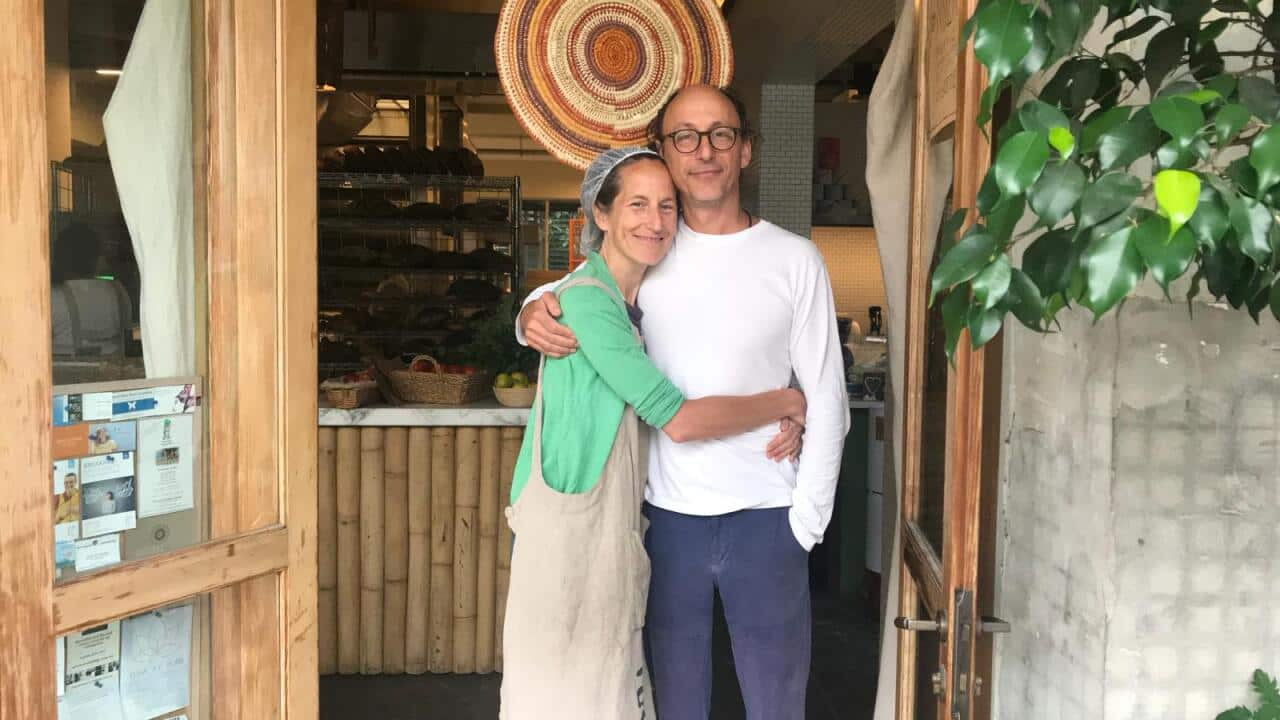Five minutes from Bronte Beach at 131 Macpherson Street, the Ivanovic family, Igor, Ludmilla and their four daughters wake up every morning with the smell of freshly baked bread. Their house stands behind their bakery, and the flour is stored in their garage, then it goes directly to the factory's kitchen using an underground pump. The dough is kneaded by hand, know-how and authenticity are the keywords of the place.
"There is an incredible quality of life here, especially thanks to the sea"
Ludmilla grew up in Montreal, and at the age of 19, she decided to move to New York. She met Igor Ivanovic in a bakery, they settled together and decided to open their shop in Boston, which is still active. After a trip to New Zealand, they travelled through Australia and fell in love with the country and its quality of life. They are opening a second Iggy's Bread bakery on the other side of the world.

Eco-friendly bakery Iggy's Bread Source: Joanna Cabot
Food as a medicine
It is with ancient flour made from grains dating from the years 1900-1930, salt and water full of minerals, which stands the recipe for success. But no"gluten-free" bread because "natural fermentation makes leavened bread." Here we consider food as medicine, and therefore we try to make the bread as nutritious as possible, "says Ludmilla. Iggy's Bread offers local products, and Ludmilla is proud of it, "many farmers bring us their products, but we also sell other products that we use, want our customers to discover, which we believe in." All products are encouraged to be used because they are good for health and some products are delicious with bread ".
Iggy's Bread offers local products, and Ludmilla is proud of it, "many farmers bring us their products, but we also sell other products that we use, want our customers to discover, which we believe in." All products are encouraged to be used because they are good for health and some products are delicious with bread ".

Ancient flour is used to make the bread Source: Joanna Cabot
Quality of life, a leitmotif
"Everything is organised around the quality of life, we get up at 5 in the morning, we are very involved - we have planted food on the street, herbs, fruits, vegetables, we are very close with the community", explains Ludmilla. "Everything that is on the ground is reused; flour level, seeds, dough, pieces of burned bread. We have 15 worm farms, so we feed the worms with the food remains, and the juice formed is used to feed all the plants on the street. " "Once a week, we bring our food leftovers to community gardens, everything is recycled, fermented, we take a lot of responsibility for the environment, that's a big part of who we are, the team, our customers", insists the boss. Solar panels are installed on the roof and rainwater is reused.
"Once a week, we bring our food leftovers to community gardens, everything is recycled, fermented, we take a lot of responsibility for the environment, that's a big part of who we are, the team, our customers", insists the boss. Solar panels are installed on the roof and rainwater is reused.

Source: Joanna Cabot
A place for the community
More than a bakery, Igor and Ludmilla have made Iggy's Bread a place of sharing and caring. Every Friday, it's time for "Bagdad Coffee", free or by donation, the hot drink is distributed to whoever wishes, with rolls, butter, jam and milk they make their own, from nuts. They sell recycled salt bags, ceramic coffee cups created by their neighbours, and Aboriginal art.
"We all work together here, it's not a question of money, it's a matter of humanity, a dream to live every day in vision of what we would like to see in the world."
"Working hours are based on the quality of life, we close early in the summer, at 1 pm, it allows everyone to enjoy the day". For Ludmilla, the human side comes first, "the whole team is supportive, we are like a big family, we respect each other, and we help each other".

a coffee is offered every friday Source: Joanna Cabot
"Everyone is involved in the bakery, in a unique and individual way that makes it so special."
It's environmental awareness, communication and the relationship with others that have driven Ludmilla to engage more with the community. "We support aboriginal communities, we do a lot of reading with people who are turned to food and medicine who come to talk, we give advice, and we get educated. If you come with your shopping bag, we give you a little free bread to encourage you to recycle, but we do not want to give a lesson, the click needs to come from you. "
